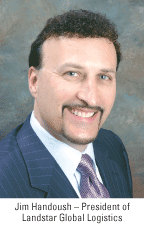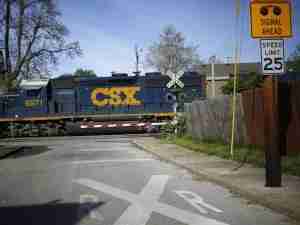For Landstar System Inc. and units such as its expanding global logistics operating company, the road to success is being paved by a network of agents, third-party capacity owners and company employees.
Jacksonville, FL-based Landstar System launched Landstar Global Logistics Inc. last August in an effort to expand its successful non-asset-based formula to customers seeking supply-chain solutions on a worldwide basis.
'The way that we're successful is to invite small-business owners into the mix and help them from a growth standpoint,' said Jim Handoush, who in January became President of Landstar Global Logistics.

The business model, which already has thrived by relying on a solid base of independent sales agents and capacity providers, is now being extended to include owners of warehouse facilities, Handoush noted.
'Our customers are driving us to get more involved on the warehousing side,' said Handoush, who spent 14 years with the Con-Way Transportation Service group, last as president of its Long Beach, CA-based container freight division, before joining Landstar a decade ago in a chief financial officer role.
Just as Landstar traditionally has depended upon 'business capacity owners,' or 'BCOs' in 'Landstar-speak,' to get loads from pickup to destination, the logistics unit is currently looking to 'warehouse capacity owners,' or 'WCOs,' to provide their services for a percentage of revenue.
Plans call for a small-scale rollout of the warehousing effort in the third quarter of this year, with full operations to be in place in 2007. Whereas company research has identified some 6,600 potentially available small to mid-sized warehouse operators in the United States alone, initial plans are for starting with about 15 primary WCOs ' one in each of the nation's top markets.

'We think it's going to be a 'win-win,'' said Hal Gerkens, President and Chief Executive Officer of Landstar System.
Since joining Landstar in 1988 as CFO, Gerkens, a former Price Waterhouse certified public accountant, has seen the corporate model flourish while providing entrepreneurs with expanded revenue opportunities.
Indeed, Landstar has been a perennial recipient of honors such as treasured spots among Fortune magazine's 'America's Most Admired Companies' and Forbes magazine's 'Platinum 400 List of America's Best Big Companies.' Moreover, since going public in 1993 at $13.50 per share, Landstar, traded on Nasdaq, has reached an adjusted worth of $344 a share when a trio of stock splits plus value appreciations are figured in.
'We're very pleased and proud,' Gerkens said of the magazine honors. 'We continue to strive for excellence.'
Landstar's revenue topped $2.5 billion in 2005, up some 25% over the preceding year, and putting the company well ahead of pace to reach a goal set in 2003 of $3 billion in revenue for 2008. Gerkens said he would like to see Landstar revenue hit $6 billion by 2013.
One way Landstar has been able to expand is by augmenting its traditional business capacity owners (BCOs) with contracted broker carriers, each with its own operating authority and freedom to haul for anyone. While BCOs get paid an average of 75% of revenue on a given load, broker carriers get paid according to a margin split based upon a predetermined percentage.
In 2003, BCO revenue accounted for 69% of Landstar revenue, Its share slipped to 56% in 2005, according to Gerkens. While Landstar's number of available BCOs grew from 7,584 to 8,011 over those two years, the company's available broker carriers burgeoned from 15,526 to 22,511.
BCOs select their loads from Landstar's Web-based listings of available freight, unlike employee drivers of some companies, who are force-dispatched and get paid on a cents-per-mile basis rather than wi







